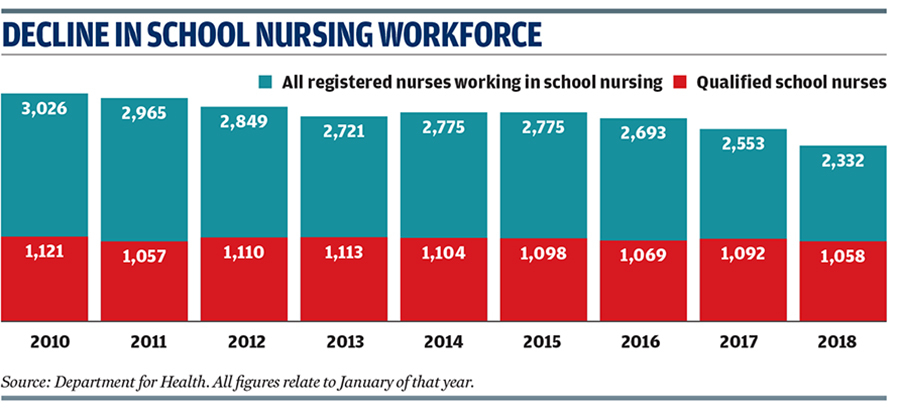Children's Workforce Guide to Qualifications and Training: Health
Charlotte Goddard
Friday, August 31, 2018
Children's nursing is the only nursing sector that is showing growth, with the number of children's nurses rising from 46,309 in 2014 to 49,793 in 2018, according to regulatory body the Nursing and Midwifery Council (NMC).
Since August 2017, new nursing, midwifery and allied health students in England no longer receive NHS bursaries, and instead have to take out student loans. Students in Wales still receive the bursary. Applications to study nursing plummeted from 65,620 in 2016 to 48,170 in 2018 according to the Universities and Colleges Admissions Services (UCAS). By contrast, Children and Young People nursing programmes remain over-subscribed, but not by as much as in the past, according to Debbie Fallon, chair of Children and Young People's Nurse Academics UK.
Training in nursing and midwifery is set to undergo some changes from January 2019, following the launch of new standards for students and training providers. The pool of professionals allowed to supervise and assess students has been widened and the new standards have a greater emphasis on mental health.
The sector continues to explore new routes into nursing including a nursing associate role designed to bridge the roles of healthcare assistant and registered nurse. The government has said there will be 5,000 nursing associate training places available in 2018 and 7,500 in 2019. "The nurse associate programme is likely to be the option that more mature students will take up, rather than pay for the university degree," says Fallon. A consultation on the standards of proficiency for nursing associates closed in July, and the NMC expects to publish finalised standards in October 2018.
Since 2017, potential nurses have been able to take degree-level apprenticeships, combining university study with paid work, although so far take-up has been low, with only 30 starters last year.
The postgraduate Nurse First programme is another new route into nursing. It aims to fast-track graduates from other sectors into registered nursing positions. The pilot cohort of 40 students began their studies in September 2017 and will complete in August 2019.
In 2015, local authorities assumed responsibility for the commissioning of public health services for children aged five and under, adding to their existing responsibility for public health services for older children and young people. Over the past 12 months, many local authorities have begun to commission children's public health services in different ways, with school nurses and health visitors increasingly employed in local authority settings or social enterprises.
With budget cuts continuing to bite, there are growing concerns that health visitor and school nurse roles are under threat. The number of health visitors employed by the NHS fell from 10,309 in October 2015 to 8,275 by January 2018. The number of full-time qualified school nurses has fallen by 23 per cent since 2010. When it comes to those employed by NHS trusts in England alone, official figures show the number of registered nurses working in school nursing fell from over 3,000 in 2010 to around 2,300 in 2018. Within that, the number of full-time equivalent nurses with a specific school nursing qualification also declined.
There are other health-related opportunities arising in schools as the government announced the launch of Mental Health Support Teams, which will treat those with mild to moderate mental health issues in school, and help children and young people with more severe needs to access the right support, providing a link to specialist NHS services. Once rolled out across the country, the teams could employ up to 8,000 people. Seven higher education institutions in England will offer Education Mental Health Practitioner courses from January 2019, with the first teams due to begin working in schools and colleges in trailblazer locations by the end of 2019. The trailblazers will be rolled out to at least 20 per cent of the population by the end of 2023, according to the government.
The government has also announced the creation of designated senior leads for mental health in schools and colleges. These are likely to be an existing member of staff, senior enough to take a strategic overview of the institution's approach to mental health and wellbeing. This includes looking at ways to support staff mental health and wellbeing. The Department for Education says it is investigating the current availability of high-quality courses, and that it will work with providers to make sufficient places available to offer training to up to one-fifth of schools from September 2019.

NEW QUALIFICATION IN SCHOOL MENTAL HEALTH
Leeds Beckett University has launched what it claims to be the first university Masters degree programme aimed at equipping school leaders to protect the mental health of pupils. The part-time two-year MA in Leadership of School Mental Health and Wellbeing course launches in September 2018, alongside a one-year Postgraduate Certificate.
The course will run both at the university's Headingley campus and through distance learning. It will be delivered in conjunction with the Carnegie Centre of Excellence for Mental Health in Schools, a partnership between Leeds Beckett University and social enterprise and mental health experts Minds Ahead. Dean Johnstone, chief executive of Minds Ahead, says the qualification was created in a bid to fill a gap in training. "There is a chronic lack of professional support and guidance for the growing number of mental health leads within our schools," he explains.
The course has a practical focus. School leaders will be required to conduct mental health audits and implement whole-school action plans. The course will cover elements of child therapy, education psychology, mental health nursing, school leadership and teaching. Participants will learn how to recognise issues such as low self-esteem, anxiety and depression, in order to take steps to improve the mental health of the children in their care.
Read more from CYP Now's Children's Workforce Guide to Qualifications and Training




